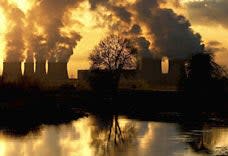London can be the world’s green finance capital, Drax power station giant declares

Green finance is a key plank of Boris Johnson’s plans for the City post-Brexit
The chief executive of energy giant Drax today ditched plans to build Europe’s biggest gas-fired power plant and declared London and the UK were well placed to be the centre for green finance.
Will Gardiner said he had decided not to turn two redundant coal-fired units into gas at the vast Drax plant in North Yorkshire. The decision to mothball them was revealed earlier this month in the Evening Standard.
Instead, the space is likely to be used to build green carbon capture equipment to trap CO2 from its other four units, which have been switched from burning coal to burning what the company says is sustainable biomass.
If Drax can get the government subsidies, the hope is that it can create bioenergy with carbon capture and storage (BECCS) on the site, with the carbon from the wood biomass it burns being piped to the Humber for storage under the North Sea.
Plans for the new gas plant had been attacked by environmental groups who said it was against the spirit of tackling climate change.
Gardiner said: “We have made a decision [not to proceed] based on our view of the merits of doing gas against the merits of doing BECCS.”
Drax is a key part of the Zero Carbon Humber “cluster” of industries who plan to extract carbon from their polluting gases and send them through a shared pipe to the undersea storage.
Gardiner said he was hopeful the government would back the Humber project, which requires huge taxpayer funding, so it could press ahead with the £1 billion investment project to bring BECCS to Drax.
He said he hoped the funds could be raised in 2023 or 2024 without recourse to raising money from shareholders, indicating some kind of green finance package could be arranged.
“I think the opportunities for green finance is pretty interesting in this country,” he said, adding that the City could be losing some of its financial work post Brexit, meaning it had spare capacity that could be used for green financing.
“The UK has a very strong consensus in favour of decarbonising and is uniquely a place with massive expertise in financial markets.”
He said UK banks were already offering green discounts on loans, which Drax had been taking up last year. “It’s not a large amount but the banks here are clearly committed to a green agenda,” he said.
Green finance is a key plank of Boris Johnson’s agenda for how the City can make up for the losses it will sustain from Brexit.
Friends of the Earth welcomed Drax’s decision to kill off the gas plan but accused Drax of still receiving £2 million a day in government subsidies to burn wood in an “incredible inefficient old power station with carbon impact.”
Drax said the decision would cost it £13 million. Other charges related to the obsolescence of its coal operations took charges up to £239 million in the year to 31 December, with a further £34 million cost run up from the redundancy and other costs of closing its two remaining coal units.
That left it with a total operating loss of £156 million.
Stripping out those one-off costs, underlying profits were £412 million against £410 million the previous year. Covid-19’s effect on its SME customers cost it £60 million.
Drax will pay a total dividend of 17.1p a share against 15.9p a year ago. That dividend increase of 7.5% brings to 11% the average annual increase from 2017 to 2020.
Read More
Drax says Covid-19 could cost it £60m
Drax set to pull out of developing giant UK gas-fired power station amid environmentalists’ anger

 Yahoo Finance
Yahoo Finance 